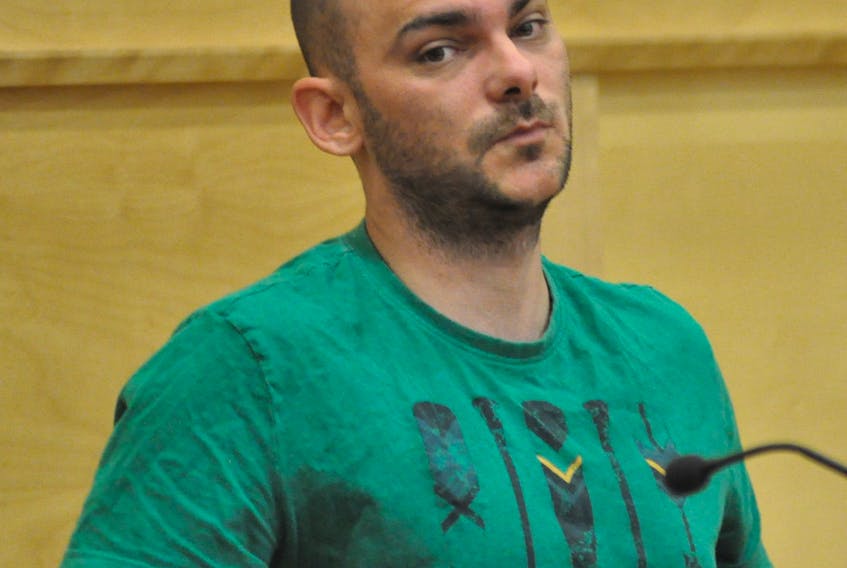ST. JOHN'S, N.L. — The Newfoundland and Labrador Court of Appeal has reduced the jail term of a Corner Brook man who was convicted last year of internet luring and child pornography offences, saying parts of his original sentence were demonstrably unfit.
Matthew James Carter, 35, was given an eight-year total jail term in January 2018 after he pleaded guilty to two counts of child luring, two counts of making sexually explicit material available to a child, and one count each of attempting to make sexually explicit material available to a child and distributing child pornography.
The total jail sentence imposed at that time by Judge Wayne Gorman — which was initially miscalculated at seven years instead of eight — was higher than what the Crown and defence lawyers had suggested.
Gorman noted the seriousness of the crime and Carter’s high level of “moral culpability,” which he said was significantly increased by Carter’s forethought and deliberation.
Carter had used Instagram, Snapchat and an instant messaging app to contact four girls in the U.K., aged between 11 and 14 years, between November 2015 and February 2017.
In the case of one child, she replied, “Don’t text me,” after receiving an initial message from Carter, but he ignored it and sent two more explicit texts. He sent a photo of his penis to another child.
Carter sent a photo and video of his penis to another of the children, which were intercepted by her parents, since she had told them an older man was messaging her.
In the case of the oldest child, who had a cognitive developmental delay, Carter sent a series of messages over a period of a month, calling himself “Daddy” and telling her he liked children.
When the girl complied with Carter’s request to send him sexually explicit videos of herself, he sent them to other people.
Carter had used Instagram, Snapchat and an instant messaging app to contact four girls in the U.K., aged between 11 and 14 years, between November 2015 and February 2017.
In victim impact statements presented at Carter’s sentencing hearing, some of the girls said they were afraid Carter might come after them in person. Their parents spoke of experiencing anxiety and fear as well.
Carter appealed his sentence on the grounds that it was well above the normal range and not supported by precedent. Gorman made a mistake in finding forethought and deliberation to be aggravating factors in the case, Carter alleged, and should not have made adjustments to the accepted sentence range for some of the crimes based on legislative increases to the mandatory minimums.
Last week, a panel of Court of Appeal judges agreed. Though they sided with Gorman’s sentencing for some of the individual crimes, they reduced Carter’s total sentence from eight years to five years and three months, noting the prior cases referenced by Gorman mostly involved more serious circumstances and lower sentences.
Forethought and deliberation are facts in almost every case of child luring, exposing children to pornography and distributing child pornography, Justice William Goodridge wrote in a decision backed by two other Newfoundland and Labrador Supreme Court justices. These aren’t crimes of opportunity, he said.
“Forethought and deliberation were not aggravating factors on this case as they were implicit in the crimes. It was an error of law for the trial judge to treat them as aggravating factors that ‘significantly increased Mr. Carter’s moral culpability.’”
The increases Gorman had made in his original sentence to account for changes to the mandatory minimums for some of the crimes were excessive, the panel determined, and as a result, Carter’s sentence was “demonstrably unfit.”
The appeal judges reduced Carter’s jail sentence when it came to his convictions for attempting to make sexually explicit material available to a child, as well as the two charges of making such material available to children.
Goodridge noted the errors applied to Carter’s specific circumstances only, and stressed the seriousness of his crimes.
“I agree with the trial judge that the offence of child luring must be dealt with seriously by the courts and I agree that children, as vulnerable members of our society, must be safeguarded against predators who abuse the internet to lure children into situations where they can be sexually exploited,” Goodridge said.
The panel upheld other orders Gorman had made in sentencing Carter, including that he have no contact with the girls, that he register for life as a sex offender, that he submit a DNA sample, and that he have only specifically restricted communication with anyone under 16.
Twitter: @tara_bradbury
RELATED









